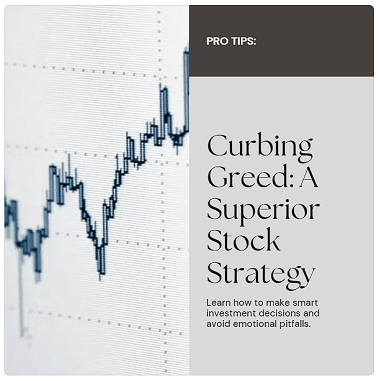
How to Curb the Need for Greed: Cutting Emotional Excess for Superior Stock Strategy By Trade Ideas
Traders often romanticize the ambitious hunger embodied by iconic capitalists like Gordon Gekko, often proclaiming, “Greed is good.” However, experienced investors distinguish between ambition and emotional excess. While some appetite for profit fuels achievement, unchecked greed distorts our psychology, leading to rash actions that sabotage returns.
Traders can easily find themselves addicted to greed, unconsciously enabling its desires. The body tingles as open profits evaporate, cursing the ambition that led to this point without an exit plan. Desperation sets in, doubling down in an attempt to will the trade back in their favor rather than acknowledging the false premise greed encouraged.
Mastering emotion is essential, as traders often find themselves caught in a tug-of-war between fear and greed. Greed manifests as an irresistible itch to chase extravagant gains or instant jackpots, whispering “bet bigger” without moderation in its thirst. It convinces traders to abandon tested discipline during heated runs, hoping to ride some indefinite hot streak.
This article explores the psychological impact of greed and techniques to curb its detrimental influence. Let’s enhance discipline to filter out distortive noise and distill trading decisions down to strategic signals. The markets reward rational consistency over episodic thrill-seeking.
How Greed Distorts Stock Trading Mentality
Unchecked greed leads to poor decisions but can be controlled through emotional regulation tactics. Besides fear, greed is a trader’s most powerful and dangerous emotion. From the temptation to chase hot trends to taking on too much risk through overleveraging, greed can be the most significant obstacle traders face in their journey.
Learning to moderate emotional extremes keeps traders aligned with a rational strategy instead of being jerked about by cognitive dissonance. Cutting excess through mindset shifts and risk controls focuses on trading calculated probabilities over impulsive fortune hunting. By mastering the mental game, traders sustain a superior position.
The Temptation to Chase Hot Trends
Emotions breed impulsivity, leading to actions before thoughtful consideration. Among greed’s most common pitfalls lies the irresistible temptation to chase the hottest stock and crypto trends, regardless of underlying fundamentals. As the fear of missing out (FOMO) reaches fever pitch, traders pile into extended rallies, hoping to ride massive momentum. Logic clouds amid the mania, with prudent risk metrics tossed aside to increase exposure. Seasoned investors know such conditions often signal tops rather than opportunities. Having missed the initial pop, greed compels chasing anyway, culminating in buying highs.
Taking On Too Much Risk / Over-leveraging
Emotional excess also pushes traders to ratchet up risk parameters past prudent levels. As open profits swell, belief in personal invincibility sets in, becoming a dangerous narrative. Traders feel bulletproof enough to disregard stop losses or restraint on position sizing that once protected capital. The outsized risk ultimately backfires as a turn in fortunes washes away open gains and then some. Greed’s blindness allows traders to ignore thinning ice, giving way beneath their emboldened strides.
Refusing to Admit Mistakes or Accept Losses
When trades inevitably go awry, greed further distorts psychology through stubborn refusals to admit errors. Writing off emerging red flags as temporary setbacks rather than heeding warnings becomes commonplace. Hope and false optimism replace rational exits. Traders rage against accepting failure, often ‘doubling down’ with yet more capital in desperate attempts to will deals back their way. Such ego leads directly off cliffs, turning isolated mistakes into catastrophes as capital floods from breaches never patched.
Engaging in Revenge Trading
Even after the initial sting of losses finally registers, greedy and destructive impulses rarely conclude there. A wounded ego often compels traders towards revenge trading – desperately taking unnecessary risks while on tilt from previous defeats. Like a gambler down on luck, traders fueled by emotion rather than detached analytics dig yet deeper holes fueled by irrational belief previous mistakes somehow dictate higher probability plays ahead. Of course, that statistical fallacy only exacerbates bleeding. Each vengeance strike was less precise than the last when only walking away would steady vision. Greed’s stubbornness offers zero peace, preventing acceptance essential to renewal.
Impacts on Trading Strategy and Returns
Unchecked greed severely compromises the critical tenets of successful trading – risk management, timing, profit, and loss mitigation. Emotionally charged trades ignore stop losses, enter too early without confirmation, or too late by chasing. Greed blinds traders from selling winners too quickly, while obstinance allows losers to run despite warning signals. These distortions yield subpar risk-reward ratios, missed gains, and amplified losses. No strategy survives without discipline to follow its rules rather than fleeting moods surrounding trades.
Techniques to Curb Greed and Emotion
Establishing layer upon layer of protection insulates strategy from insidious greed eroding returns. Recording explicit reasoning before trades helps internal reflection to justify actions besides sheer appetite. Predefining exit points for profit taking and loss cutting streamlines execution without situational emotion dictating overrides. Balancing asset classes lessens dependence on any single one. Developing self-worth apart from finances detaches self-esteem from volatile external outcomes. Reviewing trades without judgment extracts universal lessons for circumstances beyond just that instance.
Benefits of a Disciplined Rational Approach
When traders suppress visceral impulses surrounding trades and adhere steadfastly to strategy rules, statistics tend to favor the disciplined approach over time. The risk-reward ratio improves as technical rather than psychological milestones dictate actions. Loss size shrinks without emotional paralysis, allowing problems to compound before finally facing reality. Patience sustains without chasing every shiny new opportunity. Sustaining capital preserves one’s capability to try again rather than enabling a trading career through reckless actions in the hot pursuit of greed’s ephemeral highs. Discipline yields far more than mere excitement over the long arc.
Beating the Need for Greed
Though greed feels irresistible at the moment, surrendering to its whims is a disaster for all but the most disciplined outliers who generated enormous advantages before indulging in such luxuries. For the majority, greed remains an ever-present threat, yet controlling its influences through learned techniques liberates the trading strategy to thrive on its merits rather than emotional distortions.
By aligning actions to predetermined rules, risk metrics, and probability guideposts defined through rigorous backtesting and refinement, traders remove impulse and mood fluctuations from dictating critical order execution. Calm systematic inputs beget calm systematic outputs; in other words, technical truths trump feelings’ lies.
In conclusion, while greed never fully atrophies, its harmful potential withers significantly when starved of hasty decisions perpetuating undue influence. Get out of your own way by committing today to developing new habits, squelching emotional excess so you may trade tomorrow free of its burden. Through patience and consistent work, you can learn to master your emotions and watch the need for growth surpass the need for greed. For more tips on how to manage your emotions and risk, visit Trade Ideas for expert help and education on your journey.



